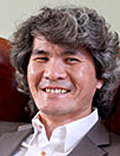
Glial mechanisms underlying cognition
The high cognitive function is one of the most important reasons why human beings are considered to be the primaries of all things. Cognitive functions include learning and memory, communicational ability with other objects and any other diverse abilities needed for social activities. The deeper we understand the human cognitive function, the more we could properly perceive humanity itself.
In order to reveal the mechanisms related to cognitive function, we focus on astrocyte which is one of the most abundant cell types in central nervous system. In the last century, even though most of the neuro-centric researchers have revealed many secrets of brain, it has not been able to answer all the mysteries in neuroscience. Our group seeks to understand sophisticated cognitive function deeper by uncovering the physiological functions of astrocyte which are being deviated from the existing neuronal research paradigm.
In addition, we study on the unique state of astrocytes in a pathological condition, called “reactive astrocyte.” Reactive astrocyte would be a powerful diagnostic and therapeutic target for brain diseases. Research on properties of reactive astrocyte will provide important clues for several brain diseases that have not been conquered yet. Therefore, we investigate the way regulating reactive state of astrocytes, and recovering cognitive function from brain diseases.
Our group also devotes ourselves to training young brain scientists to lead the future of South Korea. These young scientists will lead Korean neuroscience society to the top in the world, solidify the foundation of the basic science in Korea, and serve as a foothold for treating brain diseases. This is our ultimate goal to present new hope to patients who are still fighting brain diseases today.
Research Interests
Glioscience, Electrophysiology, Cognition and behavior, Brain diseases, Glia-neuron interaction, Glioplasticity and cognition, Gliopathy
- 1986 - 1990 Junior Research Assist. Louis Seiden’s Lab. University of Chicago
- 1990 - 1991 Research Assistant Emily Foster’s Lab. Michael Reese Hosp.
- 1991 - 1992 Graduate Research Assist. Columbia University
- 1993 - 1994 Research Technician Martin Low’s Lab. Columbia University
- 1994 - 1996 Research Technician MacDermott’s Lab.Columbia University
- 1996 - 2001 Graduate Research Assist. MacDermott’s Lab.Columbia University
- 2001 - 2004 Post Doctoral Fellow Traynelis’s Lab. Emory University
- 2004 - 2010 선임연구원, 한국과학기술연구원
- 2010 - 2018 책임연구원, 한국과학기술연구원
- 2017 - 2018 연구단장, 신경교세포연구단, 한국과학기술연구원
- 2018 - 현재공동연구단장, 인지 및 사회성 연구단, 기초과학연구원
- 2017 과학기술포장, 행정자치부
- 2016 경암학술상, 경암교육문화재단
- 2014 FILA 기초과학상, 한국과학기술한림원
- 2014 장진학술상, 한국뇌신경과학회
- 2013 스타교수상, 과학기술연합대학원대학교(UST)
- 2013 우수연구논문지도상, 과학기술연합대학원대학교(UST)
- 2012 최우수교수상, 과학기술연합대학원대학교(UST)
- 2011 올해의 과학자상, 한국과학기술연구원
- 2010 과학기술진흥유공자 우수연구기관 및 연구원포상, 교육과학기술부
- 2010 이달의 과학기술자상, 교육과학기술부
- 2010 이달의 KIST인상, 한국과학기술연구원
- 2009 박원희연구상, 한국과학기술연구원
- 2009 UST 우수강의상, 한국연합대학원
- 2009 우수연구지도상, 한국연합대학원
- 2009 우수직원상(연구회 이사장), 기초기술연구회
- 2003 Outstanding Researcher Award, Association of Korean Neuroscientists
- 2000 Outstanding Researcher Award, Association of Korean Neuroscientists
대표논문
- Heo JY, Nam MH, Yoon HH, Kim J, Hwang YJ, Won W, Woo DH, Lee JA, Park HJ, Jo S, Lee MJ, Kim S, Shim JE, Jang DP, Kim KI, Huh SH, Jeong JY, Kowall NW, Lee J, Im H, Park JH, Jang BK, Park KD, Lee HJ, Shin H, Cho IJ, Hwang EM, Kim Y, Kim HY, Oh SJ, Lee SE, Paek SH, Yoon JH, Jin BK, Kweon GR, Shim I, Hwang O, Ryu H, Jeon SR, Lee CJ (2020). Aberrant Tonic Inhibition of Dopaminergic Neuronal Activity Causes Motor Symptoms in Animal Models of Parkinson's Disease, Curr Biol, pii: S0960-9822(19)31581-7.
- Oh SJ, Lee JM, Kim HB, Lee J, Han S, Bae JY, Hong GS, Koh W, Kwon J, Hwang ES, Woo DH, Youn I, Cho IJ, Bae YC, Lee S, Shim JW, Park JH, Lee CJ (2019). Ultrasonic Neuromodulation via Astrocytic TRPA1. Curr Biol,, pii: S0960-9822(19)31037-1.
- Nam MH, Han KS, Lee J, Won W, Koh W, Bae JY, Woo J, Kim J, Kwong E, Choi TY, Chun H, Lee SE, Kim SB, Park KD, Choi SY, Bae YC, Lee CJ (2019). Activation of Astrocytic mu-Opioid Receptor Causes Conditioned Place Preference, Cell Rep. 28(5):1154-1166.e5.
- Park JH, Ju YH, Choi JW, Song HJ, Jang BK, Woo J, Chun H, Kim HJ, Shin SJ, Yarishkin O, Jo S, Park M, Yeon SK, Kim S, Kim J, Nam MH, Londhe AM, Kim J, Cho SJ, Cho S, Lee C, Hwang SY, Kim SW, Oh SJ, Cho J, Pae AN, Lee CJ, Park KD (2019). Newly developed reversible MAO-B inhibitor circumvents the shortcomings of irreversible inhibitors in Alzheimer's disease, Sci Adv. 5(3):eaav0316
- Woo J, Min JO, Kang DS, Kim YS, Jung GH, Park HJ, Kim S, An H, Known J, Kim J, Shim I, Kim HG, Lee CJ, Yoon BE (2018). Control of motor coordination by astrocytic tonic GABA release through modulation of excitation/inhibition balance in cerebellum. Proc Natl Acad Sci U S A. pii: 1721187115.
- Junsung Woo*, Jieun E. Kim*, Jooyeon J Im*, Jaekwang Lee, Hyeonseok S. Jeong, Seahyung Park, Soon-Young Jung, Heeyoung An, Sujung Yoon, Soo Mee Lim, Sunho Lee, Jiyoung Ma, Emily Yunha Shin, Young-Eun Han, Binna Kim, Eun Hee Lee, Linqing Feng, Heejung Chun, Bo-Eun Yoon, Ilhyang Kang, Stephen R. Dager, In Kyoon Lyoo and C. Justin LEE (2017). Astrocytic water channel aquaporin-4 modulates brain plasticity in both mice and humans: a potential gliogenetic mechanism underlying language-associated learning, Molecular Psychiatry. 23(4):1021-1030.
- Jo S, Yarishkin O, Hwang YJ, Chun YE, Park M, Woo DH, Bae JY, Kim T, Lee J, Chun H, Park HJ, Lee DY, Hong J, Kim HY, Oh SJ, Park SJ, Lee H, Yoon BE, Kim Y, Jeong Y, Shim I, Bae YC, Cho J, Kowall NW, Ryu H, Hwang E, Kim D, Lee CJ (2014), GABA from reactive astrocytes impairs memory in mouse models of Alzheimer's disease. Nat Med. 20(8):886-96.
- Eun Mi Hwang, Eunju Kim, Oleg Yarishkin, Dong Ho Woo, Kyung-Seok Han, Nammi Park, Yeonju Bae, Junsung Woo, Donggyu Kim, Myeongki Park, C. Justin LEE, Jae-Yong Park. (2014), A disulphide-linked heterodimer of TWIK-1 and TREK-1 mediates passive conductance in astrocytes, Nat Commun., 5:3227. (Co-corresponding author)
- Dong Ho Woo, Kyung-Seok Han, Jae Wan Shim, Bo-Eun Yoon, Eunju Kim, Jin Young Bae, Soo-Jin Oh, Eun Mi Hwang, Alan D. Marmorstein, Yong Chul Bae, Jae-Yong Park, C. Justin LEE (2012), TREK-1 and Best1 channels mediate fast and slow glutamate release in astrocytes upon GPCR activation., Cell, 151(1):25-40
- Soojung Lee, Bo Eun Yoon, Ken Berglund, Hyungju Park, Hee-Sup Shin, George J. Augustine, C. Justin LEE (2010). Channel-mediated Tonic GABA Release from Glia, Science, 330(6005):790-6 (IF: 29.747)
- 콘텐츠담당자
- :
- 최종수정일 2022-01-27 16:24










 IBS School
IBS School





